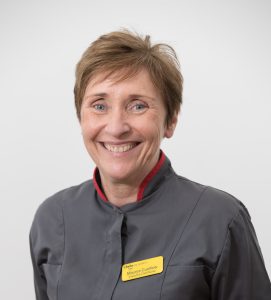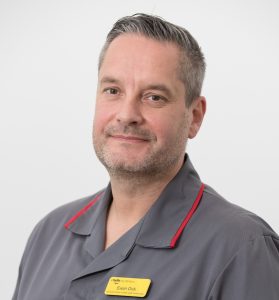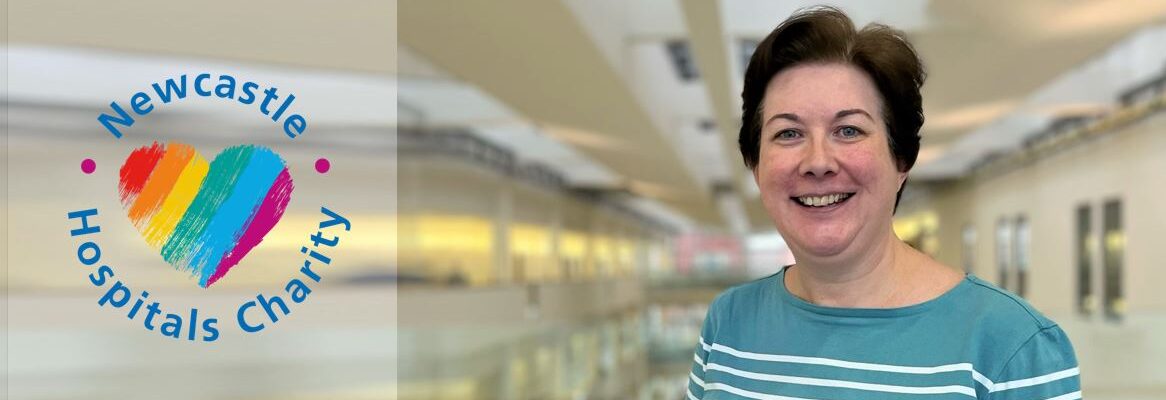Allied Health Professional Consultant Lisa Robinson has been awarded Newcastle’s first Researcher Development Institute Chief Nurse Post-Doctoral Research Fellowship.
Lisa specialises in major trauma rehabilitation at Newcastle’s Royal Victoria Infirmary – home to the Great North Trauma and Emergency Centre.
Her Fellowship seeks to improve quality and reduce patient harms by co-designing an intervention (frailty care bundle) that will promote collaborative working between nursing staff, AHPs and the broader multi-disciplinary team (MDT) to prevent the sedentary behaviours that contribute to hospital-associated deconditioning for older adults during acute hospitalisation.
Funded by the Newcastle Hospitals Charity, this Fellowship will provide Lisa with protected time (2 days/week for 12 months) and the support, guidance and mentorship of the Executive Chief Nurse NMAHP Leadership Team to lead a complex programme of work aligned with the Newcastle Hospitals NMAHPs Strategy.
The Chief Nurse Post-Doctoral Research Fellowship is designed to support a stand-alone research project that clearly aligns to the NMAHP Strategy.
Lisa’s research project reflects the key priority to improve quality and reduce patient harms.
Hospital-associated deconditioning
“Older adults are particularly vulnerable to poorer outcomes as a result of acute hospitalisation” explains Lisa.
“The complex interplay between acute illness and inactivity in an inpatient setting often manifests itself as a syndrome known as hospital-associated deconditioning.”
Hospital-associated deconditioning can occur at any age regardless of the reason for hospital admission. However, underlying frailty and hospital systems that are poorly designed for older patients can accelerate the impacts of hospital-associated deconditioning.
Lisa continues “For many older adults, the effects of hospital-associated deconditioning are more rapid, severe and may even be irreversible.
“I have been very fortunate to work alongside physiotherapy colleague, Roisin Fallen-Bailey, to develop a programme of work to promote awareness of the impact of hospital-associated deconditioning.”
As part of Roisin’s charity-funded NMAHP research internship in 2020, they undertook a local online mixed-methods survey to compare and contrast Band 5 Nurses, Physiotherapists and Occupational Therapists and Bands 2, 3 and 4 Healthcare Assistants and Therapy Assistants’ perceptions of patient activity in hospital.
They received 110 responses from a range of staff working across a variety of clinical areas. Only 7% of survey respondents agreed that the risk of falling in hospital was greater than the benefits of mobilising. However, 36% indicated that a physiotherapy assessment would be needed in the first instance to ensure that it was safe for the patient to mobilise.
The perceived role of the physiotherapist as ‘safety expert’ was evident across all staff groups working within the medical and surgical specialities and appeared to be both a barrier and an enabler to reducing hospital-associated deconditioning during an acute inpatient admission.
“We believe that promoting inpatient activity in hospital should become part of a focused rehabilitation strategy that is incorporated into the patient’s daily routine and supported by all healthcare disciplines,” says Lisa.
“An enhanced understanding of established hospital culture is necessary to develop interventions with the potential to successfully challenge the shared assumptions and professional role boundaries that underpin established day-to-day practices.
“In this way, healthcare staff can be empowered to provide high-quality, holistic care within a supportive hospital culture that exemplifies and encourages patient function and independence.”
Supporting our NMAHPs at every stage of their research journey

Of Lisa’ Fellowship Executive Chief Nurse Maurya Cushlow says “The overriding aspiration of our Researcher Development Institute is to support and develop our Nurses, Midwives and AHPs across all different stages of their research journey.
“The ambition for this particular fellowship is to focus on areas of particular importance for both our patients and our staff, and lead to not only improvements in patient care, but shape wider professional practice.”
Maurya continues “It can be challenging to create capacity and access funding to develop post doctoral research ideas whilst remaining embedded in clinical practice. It was important for us to develop a specific post-doctoral fellowship that is accessible by Nurses, Midwives and AHPs at this level.
“So I’m delighted to see one of our most experienced allied health professionals being successfully awarded our first Chief Nurse Post-Doctoral Research Fellowship. I am confident that Lisa will inspire and pave the way for like-minded colleagues through clear demonstration of how to #MakeSpace4Research and I very much look forward to seeing how Lisa’s exciting fellowship unfolds.”

Associate director for Therapy Services Ewan Dick adds: “AHPs have an important role in the assessment, treatment and delivery of rehabilitation interventions with patients across our in-patient settings but everyone can play a role in helping to reduce the harm of “deconditioning” for our patients, caused by being in hospital.
“Sometimes our hospital culture encourages sedentary behaviours which can be tackled through mobility, nutrition and hydration, activity and cognitive engagement. We have some fantastic building blocks already in place and the RDI Chief Nurse Post-Doctoral Research Fellowship will enable Lisa, working with a number of colleagues to further develop, evaluate and implement a complex intervention for older adults experiencing acute hospitalisation.
“The quality and safety impact for our patients is significant so this programme represents an important strategic priority for us all over the coming months and years.”
The project
Lisa’s Fellowship will focus on improving quality and reducing patient harms through the development of a frailty care bundle – an intervention promoting collaborative working between nursing staff, AHPs and the broader multi-disciplinary team (MDT) to prevent the sedentary behaviours in older patients that contribute to hospital-associated deconditioning during acute hospitalisation.
The project will integrate existing evidence/theory relating to early mobilisation, enhanced nutrition and meaningful cognitive engagement from the published literature (mixed-methods realist review of the literature) with stakeholder engagement (co-design workshops with managers, multidisciplinary healthcare workers, patients and relatives) to gain an enhanced appreciation of how staff/patient behaviours and local contextual factors might impact on successful intervention delivery and patient outcomes.
The project represents the first phase of a five-year research programme, which aims to systematically develop, evaluate and implement a complex intervention for older adults experiencing acute hospitalisation.
On completion of the Chief Nurse Post-Doctoral Research Fellowship, the co-designed intervention will be ready to be progressively refined through a structured process of feasibility testing, formal evaluation and local implementation, and will form the basis of a subsequent HEE/NIHR Advanced Clinical and Practitioner Academic Fellowship.
Nurturing innovative clinical academic careers
“This fellowship provides an excellent learning and development opportunity to progress my post-doctoral clinical-academic career at Newcastle Hospitals,” explains Lisa.
“The part-time nature of the fellowship will enable me to continue my work within Therapy Services as one of the Strategic Theme Leads and Chair of the Quality Improvement Network together with my existing research capacity, capability and engagement activities, whilst developing my own programme of research in a clinical setting.”
Whilst leading this complex programme of work aligned with the Newcastle Hospitals NMAHPs Strategy Lisa will receive support, guidance and mentorship from the Executive Chief Nurse NMAHP Leadership Team, regularly providing updates and feedback.
Could you be one of our next NMAHP RDI Fellows?
If you would like to find out more about becoming one of our NMAHP RDI Fellows, you can go to our Researcher Development Institute webpage.
Watch our NMAHP RDI video
Our animation explains how Newcastle’s NMAHP Researcher Development Institute programme works across the four seasons of the year.
Contact us
Email Newcastle’s NMAHPs Research Team at [email protected]

